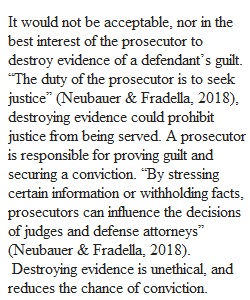


Q As stated in Read: Lecture Notes: Legal Actors - Prosecutors and Defense Attorneys, the prosecutor is charged with finding and pursuing justice. Conversely, the defense attorney is to zealously advocate on behalf of his/her client. Both sides are required to adhere to the constitutional mandates for justice. However, the lecture notes and the textbook confirm that each side can lose their way in the search for justice and exceed the boundaries of advocacy. The most common boundary violations are prosecutors withholding exculpatory evidence and defense attorneys manipulating the system in an effort to thwart justice, but let us look at the issue from another angle. Drawing from the textbook, the lecture notes, Scripture, and your scholarly research, discuss the following question and using scholarly criminal justice sources as support. Provide the rationale for your position: • Would it be acceptable for a prosecutor to destroy evidence of a defendant’s guilt? (Note: The question is not asking about a prosecutor withholding evidence of a defendant's innocence, which is the usual concern.) • Analyze from a legal and moral perspective whether it might be acceptable for a defense attorney to let his/her client be found guilty? • Examine what impact of the decisions described above (prosecutor and defense attorney) would have on the public’s trust in the criminal justice system. • You must support your opinions with scholarly sources. Please review the Discussion Assignment Instructions Download Discussion Assignment Instructionsprior to posting. You may also click the three dots in the upper corner to Show Rubric. Post-First: This course utilizes the Post-First feature in all Discussions. This means you will only be able to read and interact with your classmates’ threads after you have submitted your thread in response to the provided prompt. Submit your thread by 11:59 p.m. (ET) on Thursday of Module 3: Week 3.
View Related Questions